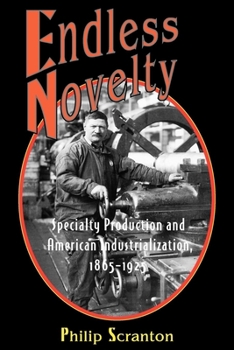Endless Novelty: Specialty Production and American Industrialization, 1865-1925
Select Format
Select Condition 
Book Overview
Flexibility, specialization, and niche marketing are buzzwords in the business literature these days, yet few realize that it was these elements that helped the United States first emerge as a global manufacturing leader between the Civil War and World War I. The huge mass production-based businesses--steel, oil, and autos--have long been given sole credit for this emergence. In Endless Novelty , Philip Scranton boldly recasts the history of this vital episode in the development of American business, known as the nation's second industrial revolution, by considering the crucial impact of trades featuring specialty, not standardized, production. Scranton takes us on a grand tour through American specialty firms and districts, where, for example, we meet printers and jewelry makers in New York and Providence, furniture builders in Grand Rapids, and tool specialists in Cincinnati. Throughout he highlights the benevolent as well as the strained relationships between workers and proprietors, the lively interactions among entrepreneurs and city leaders, and the personal achievements of industrial engineers like Frederic W. Taylor. Scranton shows that in sectors producing goods such as furniture, jewelry, machine tools, and electrical equipment, firms made goods to order or in batches, and industrial districts and networks flourished, creating millions of jobs. These enterprises relied on flexibility, skilled labor, close interactions with clients, suppliers, and rivals, and opportunistic pricing to generate profit streams. They built interfirm alliances to manage markets and fashioned specialized institutions--trade schools, industrial banks, labor bureaus, and sales consortia. In creating regional synergies and economies of scope and diversity, the approaches of these industrial firms represent the inverse of mass production. Challenging views of company organization that have come to dominate the business world in the United States, Endless Novelty will appeal to historians, business leaders, and to anyone curious about the structure of American industry.
Format:Hardcover
Language:English
ISBN:0691029733
ISBN13:9780691029733
Release Date:October 1997
Publisher:Princeton University Press
Length:416 Pages
Weight:2.25 lbs.
Dimensions:1.2" x 6.0" x 9.0"
Customer Reviews
1 rating
Economically Exciting
Published by Thriftbooks.com User , 25 years ago
I read this book several months ago for a critical essay assignment for one of my college econ. classes. Normally when I read books for reports, essays, or for anything other than entertainment, I find them to be painfully boring and longwinded. This book, however, was a pleasant surprise. The book details several companies in the Midwest and uses them to demonstrate the evolution of the American company. Scranton does an excellent job of giving examples of one or two companies in similar situations and then showing how different decisions led to good or bad results. The book seems to have emphasize the success or failure of compainies/entrepreneurs because of their own actions, as the book doesn't include much about the Civil War or major contracts. It was very easy to complete my assignment with this book, and I think it would even make for good recreational reading material.






